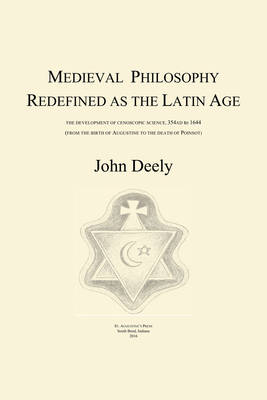
En raison d'une grêve chez bpost, votre commande pourrait être retardée. Vous avez besoin d’un livre rapidement ? Nos magasins vous accueillent à bras ouverts !
- Retrait gratuit dans votre magasin Club
- 7.000.000 titres dans notre catalogue
- Payer en toute sécurité
- Toujours un magasin près de chez vous
En raison de la grêve chez bpost, votre commande pourrait être retardée. Vous avez besoin d’un livre rapidement ? Nos magasins vous accueillent à bras ouverts !
- Retrait gratuit dans votre magasin Club
- 7.000.0000 titres dans notre catalogue
- Payer en toute sécurité
- Toujours un magasin près de chez vous
40,95 €
+ 81 points
Description
In a statement published for Paul Cobley's edition of Realism for the 21st Century. A John Deely Reader, Umberto Eco wrote that "John Deely has not only paid attention to the Second Scholasticism but also to the first one". In the present book, Deely goes one step further, by establishing the continuity of the Latin Age as a whole. He shows how the Latin thinkers demonstrated the presuppositions and created the framework of critical thought that made possible and inevitable the turn to science in the modern sense. The book thus shows how and why criticalachievements of the Latins remain requisite, even today, for the proper understanding of science and technology as offshot of the "Way of Signs" upon which all of thought, as also evikytuib as a whole, perforce travels. "With the sophistic modern and Enlightenment misconceptions about philosophy's nature and history daily crashing and burning around us, Deely's unconventional way of understanding medieval philosophy is like a breath of fresh air amid intellectual smog. This is a great book, the single most important study of medieval thought in half a century or more. It deserves an unbiased hearing by anyone today claiming to be a serious philosopher." -- Peter A. Redpath Founding Chairman, Universities of Western Civilization Chairman of the Board, The International Etienne Gilson Society "Drawing upon the thought of John Poinsot and Charles Pierce, John Deely has opened a distinctively postmodern path to the metaphysics of being, at once illuminating much of this ancient tradition while casting new light upon it in the context of contemporary thought. His treatment notably of St. Thomas is not merely a return to an earlier thinker, but an opening to a different path, at once in profound agreement with St. Thomas and yet heretofore unexplored. This book, thus, not only constitutes a return to a past era, but shows this era in a new light that illuminates as well the contemporary scene." -- Kenneth L. Schmitz Professor Emeritus, University of Toronto, Canada Pontifical John Paul II Institute for Studies on Marriage and Family, Washington, D.C.
Spécifications
Parties prenantes
- Auteur(s) :
- Editeur:
Contenu
- Nombre de pages :
- 574
- Langue:
- Anglais
Caractéristiques
- EAN:
- 9781587315046
- Date de parution :
- 18-05-20
- Format:
- Livre broché
- Format numérique:
- Trade paperback (VS)
- Dimensions :
- 150 mm x 226 mm
- Poids :
- 839 g

Les avis
Nous publions uniquement les avis qui respectent les conditions requises. Consultez nos conditions pour les avis.






